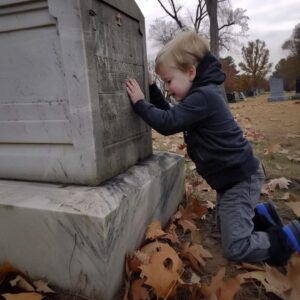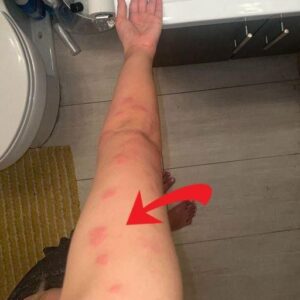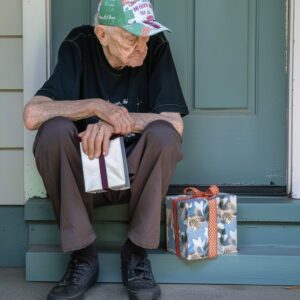The first time I saw the small pair of blue sneakers sitting beside Paul’s headstone, I assumed it was a mistake. It had to be—someone had accidentally placed them on the wrong grave. I thought maybe a grieving parent had left them in a moment of confusion. After all, mourning does strange things to people. I knew this all too well.
The shoes at his grave, though, were different. I moved them aside, placed my lilies where they belonged, and whispered my usual words to Paul before leaving. I didn’t think much of it at the time.
But when I returned the following week, another pair of shoes had appeared—this time, small red rain boots, neatly placed at the base of the headstone. That was when I began to feel uneasy. There was no way this was a coincidence. Paul and I never had children, so why were these shoes appearing? Who was leaving them? The questions gnawed at me.
Soon, my unease grew into frustration. It felt as though the universe was playing a cruel joke on me. The presence of those shoes—symbols of the life Paul and I never shared—cut deeper with each visit. I stopped going to the cemetery for a while, hoping the shoes would stop appearing if I stayed away. But when I finally returned, there were six pairs, all lined up in a neat row. My frustration boiled over into anger.
Who was doing this? Was someone trying to mock my grief?
One cold, clear morning, I decided I had to know. I went to the cemetery earlier than usual, hoping to catch whoever was responsible. I had brought lilies for Paul, but as I approached the grave, I saw her.
I froze.
It was Maya, Paul’s secretary from years ago. I hadn’t seen her since she abruptly left her job shortly before Paul’s accident. She used to be so cheerful, always smiling, always polite. But now, her face was lined with grief. There was something in her eyes, a deep sadness that mirrored my own.
“Maya?” I whispered, disbelief creeping into my voice. What was she doing here? Why was she leaving shoes on Paul’s grave?
I looked down at the photo and felt my heart drop. In the picture, Paul was smiling, holding a baby boy in his arms. The child had the same dark hair and bright eyes as Paul. The resemblance was unmistakable.
“His name is Oliver,” Maya said softly, her voice barely a whisper. “He’s Paul’s son.”
The world around me seemed to tilt. My hands shook as I clutched the photo. My husband, the man I thought I knew so well, had kept this secret from me. He had a child—a child I never knew existed.
“You were having an affair,” I said quietly, my voice hollow.
I felt as if the ground had been pulled out from under me. How long had Paul kept this from me? How could he have lied to me for so long?
Maya’s voice broke through my spiraling thoughts. “Oliver asks about his father all the time,” she continued. “I told him that his daddy is watching him from above, but every time he gets a new pair of shoes, he wants me to bring the old ones to his daddy’s grave. It’s his way of feeling connected to Paul.”
I stared at the shoes lined up by the headstone, my heart heavy with the weight of betrayal. But then, I glanced at the photo of Paul and Oliver, and something inside me shifted. This wasn’t Oliver’s fault. He was just a little boy who had lost his father. And despite everything, Paul had loved him.
I could have let her go. I could have held onto my anger and pain. But instead, something compelled me to stop her.
“Wait,” I said, my voice steady. “You don’t have to stop. If it helps Oliver, keep bringing the shoes.”
Maya looked at me, surprised. “Are you sure?”
I nodded. “He deserves to know his father, even if it’s only through small things like this. And maybe… maybe I can help him. Help him know Paul.”
Tears filled Maya’s eyes again, but this time they were tears of gratitude. “Thank you, Ellen,” she whispered.
And in time, as I got to know Oliver, I discovered a new kind of family—one born not of blood, but of shared love and loss. The shoes, once symbols of heartache, became symbols of healing.





